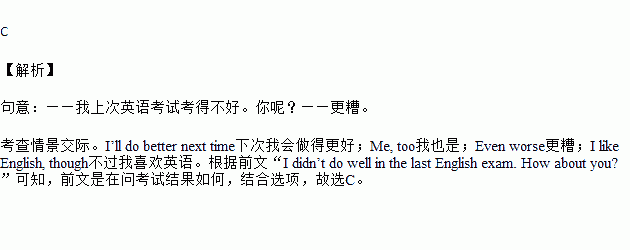题目内容
— I didn’t do well in the last English exam. How about you?
— ________.
A.I’ll do better next time B.Me, too
C.Even worse D.I like English, though
 千里马走向假期期末仿真试卷寒假系列答案
千里马走向假期期末仿真试卷寒假系列答案阅读下列短文,根据短文中的信息完成文后表格。
Going to a party, having a meal in a restaurant or receiving a birthday gift—as a teenager, you go to different places and meet different people. Everything you do will leave a deep impression (印象)on others. So manners are very important.
Getting to a place late for a date may mean: This isn’t that important to me. Ringing someone up while talking to your friend may mean: The caller is more important than the person standing in front of me. Not showing thanks to a gift giver may mean: “I don't like the gift.”
Is that the message you really want to send? Maybe not. You do not want to be rude, but sometimes what you do makes people think you’re impolite.
How can you change that? First, you should know the proper ways to behave in front of people. We call this manners. Manners are about being honest, respectful (尊重的) and considerate (考虑周到的) .
Good manners show in small things. Start to make your manners better now!
You could start by adding “please” and “thank you” to your vocabulary and avoiding bad language.
You could start by keeping a door open for someone after you to go through. You could start by showing up on time instead of letting others wait for you.
Start now! Start a new life and start to be a teenager with good manners!
1. | |
The 2. of manners | Wherever you go, you can meet different people. Others will be impressed 3. by what you do. |
4.of bad manners | 5. late may mean the date is not important. Making a call while talking to a friend may mean your friend is 6. important than the caller. Showing no thanks to a gift-giver may mean you 7. the gift. |
8. to change and improve your manners | 9. “please” and “thank you”. Avoid bad language. Keep the door open for someone after you through first. Come on time instead of letting others wait for you. |
10. | Start a new life with good manners. |

